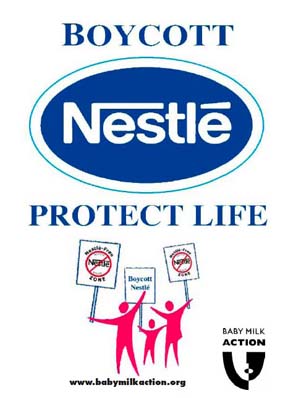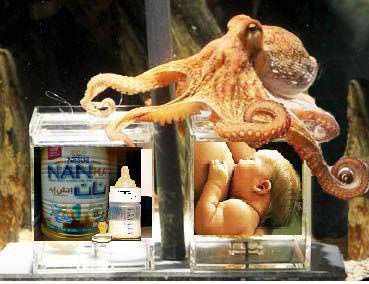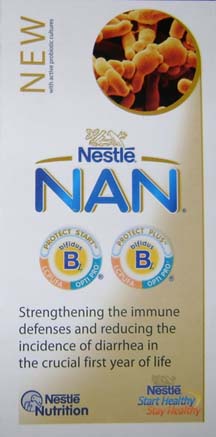Q and A with Mike Brady
The Mumsnet parenting website invited their followers to post questions to be answered by Mike Brady, Campaigns and Networking Coordinator at Baby Milk Action, and selected the following.
Edited versions of these answers will be posted on the Mumsnet site - full answers are given here.
Browse the questions provided by Mumsnet below and click on the links to go straight to Mike Brady's full answer.
what drives you to carry on campaigning?
what has been the single most positive/encouraging change you have seen during your campaign?
Bottlefeeding mums perceive Baby Milk Action to be anti formula. Whilst this may not be the case, that perception will affect the credibility of anything you say. Does your organisation need a makeover?
Do you work with schools to raise awareness of issues around the formula industry? Do you think it might be useful to educate future parents at an early age about the pros/cons of formula/BFing?
Also, just wanted to say thank you for standing up to the big corporations. Shame our politicians don't have the balls to.
My question is this: if there is one message you would like the 18-21 year old mums / dads of the future to receive about breastfeeding, what would it be?
I would like to ask Mike how Baby Milk Action can explain that concern about formula is not the same as judging mothers who use it.
Maybe an idea to respond to this one !
Along with other posters, I too am uncomfortable with this discussion. I'm afraid that BMA and it's followers really do appear to be anti formula, and to me that is unacceptable.
I am not sure if politically it is wise for Mumsnet to host a chat with an organisation which holds such one sided views. Of course they say they support both types of infant feeding, but a glance at their site would suggest otherwise.
Suffice to say I won't be posting a question.
Incidentally, why is a man fronting this campaign. Surely there are many women who would be better placed to do so?
Question 1: Mike how did you get involved with BMA?
Question 2: What practical actions can MNers do to support BMA and are there any tasks which MNers could volunteer to help out with?
Question 3: How can we launch an effective campaign to ensure HCPs know/understand and communicate the safe methods of preparing formula?
FORMULA
My question is what you would suggest to a mother who does not want to use formula but still requires, for whatever reason, milk to supplement her own?
I've come across some health care professionals who aren't as clued up on breastfeeding as what they are on formula feeding. It seems that the information is so readily available to those who want to find it, do you think there is any way of correcting the inbalance that seems to exist in some quarters?
Mike Brady My question is, how can the marketing of formula properly be controlled in the UK when the only apparent organisation to control it, the ASA, is a toothless waste of time. As it stands, if an advert is found to breach the regulations (such as the big-cup advert) the company is simply told to stop running it. Often they don't (I've seen this advert since its banning despite C&G telling me they were not running it again) and even if it isn't run again there's no requirement for retraction so viewers simply assumed it's run its course.
Hey Mike I have two questions:
1. Why do you think our food safety authorities don't test and approve formula? Surely it should be regulated so it doesn't contain such harmful things; bisphenol-A, aluminum, enterobacter sakazakii and salmonella enterica.
2. A lot of people are unaware of the risks of using formula so cant make an informed decision when deciding how to feed their babies. Do you think formula should be labeled with the health risks like tobacco boxes are?
Powdered formula is impossible to make and store in a sterile manner, and therefore liquid formula is theoretically 'safer' in terms of potential hazardous contents.
Why, then, is there no concentrated sterile liquid formula product available on the market which can be diluted with cooled boiled water to provide a safer drink for babies.
Are current liquid sterilization/pasteurisation etc. techniques effective enough to allow a bottle of concentrated liquid formula to be kept in a fridge and used safely for a number of days? Are any formula companies looking into such a product or would it not be viable?
Do you think that the other baby milk companies that also violate the marketing code are relieved that the singular focus of the campaign on Nestle takes the heat off them? Is there any competition amongst baby milk companies to be recognised and seen as the most ethical in marketing, or do they all keep their heads down to stay out of the way of bad publicity?
NESTLE
Do you think the boycott of nestle is having an impact. I haven't brought nestle products for 10 years but sometimes wonder if its worth it as they are such a huge company - not sure if little old me makes much of dent (not that I'll stop the boycott).
Hi Mike - How can I get across to people that it is important to boycott Nestle - my sons school seem to think it is something that happens abroad and nothing to do with us.
I live overseas. Nestle is ubiquitous - in the way that, oh I don't know, bread, is in the UK. Any hints for boycotting things here?
FOLLOW-ON MILK
Hi Mike - How can I get across to people that it is important to boycott Nestle - my sons school seem to think it is something that happens abroad and nothing to do with us?
There’s a mix-up with the questions, as this appears above.
FORMULA IN 3RD WORLD COUNTRIES
Do you think the use of formula in developed countries is over demonized in order to protest against it's use in 3rd world countries?
Can you see how this alienates many parents and do you think a different approach would be more beneficial?
I am interested in inappropriate formula feeding during disasters and the aftermath, such as Haiti.
How do we ensure that aid money we give is not used to provide formula and thereby increase the suffering or babies and children at such a difficult point of their lives?
Is formula safe only in countries with good water supply, good standard of living, hygiene etc?
As I understand it from "UNICEF stats www.childinfo.org/breastfeeding_infantfeeding.html etc..the majority of babies in the developing world who are not exclusively breastfed are not given other milk or given formula, but water or complimentary foods traditional in that community such as maize meal porridge.
So the challenge of enabling more women to exlusively breast feed for longer and save the lives of 140 million children a year is not simply one of breastmilk vs formula (or of poor people vs big corporates) it is also about challenging some of the traditional practices handed down from Grandmas etc...
So the question is, do you think that there is any hope, that a company such a Nestle could be a force for good. They have has so much marketing expertise, scientific research and global reach, and an interest in selling products to children and families throughout their lives - do you think there is any hope that they might become a force for good in promoting sound nutrition, from breastfeeding to eventual weening and beyond. Do you see any sign of companies doing this?
Bonus question: What is the story behind the famous twins photo?
I have seen that there was a discussion about the famous ‘twins’ picture used on a postcard sold by Baby Milk Action and so have given the background to this and the issues it raises.

 There were events throughout the week, including workshops and talks on baby-led weaning, milk banking, breastfeeding information for grandparents and the
There were events throughout the week, including workshops and talks on baby-led weaning, milk banking, breastfeeding information for grandparents and the 
 Organisations such as Nelson Mandela's Children's Fund and Breakthrough Breast Cancer have turned down donations (of £250,000 and £1 million respectively) from Nestlé because it conflicts with their funding policies. Nestlé's current Chairman, Peter Brabeck-Letmathé, has clearly stated that the purpose of supporting good causes is to benefit shareholders. Putting those who wish to run the London Marathon, often in support of a charity themselves, in the position where they have to break their boycott or put their health at risk is a pretty disgusting strategy. For further analysis of Mr. Brabeck's view of good causes see:
Organisations such as Nelson Mandela's Children's Fund and Breakthrough Breast Cancer have turned down donations (of £250,000 and £1 million respectively) from Nestlé because it conflicts with their funding policies. Nestlé's current Chairman, Peter Brabeck-Letmathé, has clearly stated that the purpose of supporting good causes is to benefit shareholders. Putting those who wish to run the London Marathon, often in support of a charity themselves, in the position where they have to break their boycott or put their health at risk is a pretty disgusting strategy. For further analysis of Mr. Brabeck's view of good causes see:
 [Left, Nestlé promotes its breastmilk substitutes to health workers with health claims, such as claiming it will reduce diarrhoea, despite the fact babies who are not breastfed are at greater risk of diarrhoea and illness and, in conditions of poverty, more likely to die. The Global Compact Office refused to investigate the way Nestlé pushes its baby milk in ways that endanger infant health and violate human rights and the Global Compact Principles].
[Left, Nestlé promotes its breastmilk substitutes to health workers with health claims, such as claiming it will reduce diarrhoea, despite the fact babies who are not breastfed are at greater risk of diarrhoea and illness and, in conditions of poverty, more likely to die. The Global Compact Office refused to investigate the way Nestlé pushes its baby milk in ways that endanger infant health and violate human rights and the Global Compact Principles].












